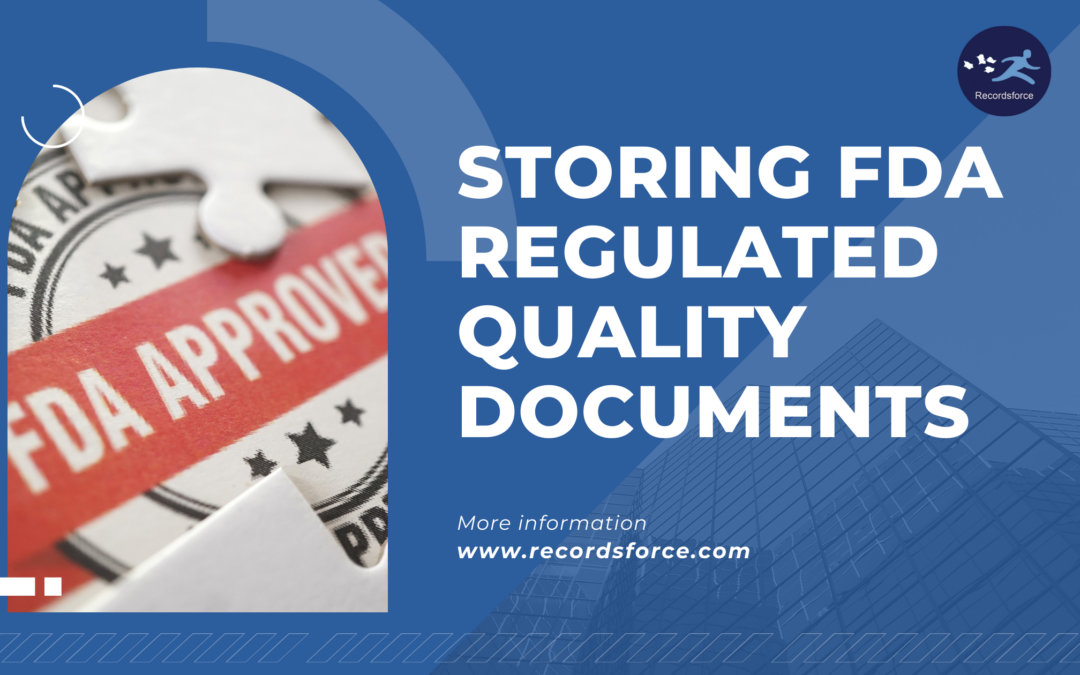The FDA has the power to slap you with reprimands, findings and even shut down manufacturing operations for a range of reasons. In our business, we’ve always focused on protecting our FDA regulated clients by making it nearly impossible to misfile a document that you might need in an FDA audit. We understand why it’s important to you to be able to calmly and quickly gather requested documents. We know you want to have time to review requests and then produce them in a way that gives your auditors confidence that your company complies with the FDA’s GMP standards.
Having your quality records managed in a formal electronic content management system is a key to successful and confident performance during audits, but it comes with strings.
If you are going to manage edits, revisions and changes to documents within a digital system versus just storing scanned images of paper records, there are implications that need to be addressed. When considering whether to use a digital system to manage the changes made to your FDA regulated quality records, like Batch Inspection Records, CCAs, Metrology Documents or Device Histories, it’s important to understand what the FDA will accept as compliant with their regulations. According to the FDA, they intend to enforce provisions related to the following controls and requirements:
- Limiting system access to authorized individuals
- Use of operational system checks
- Use of authority checks
- Use of device checks
- Determination that persons who develop, maintain, or use electronic systems have the education, training, and experience to perform their assigned tasks
- Establishment of and adherence to written policies that hold individuals accountable for actions initiated under their electronic signatures
- Appropriate controls over systems documentation
- Controls for open systems corresponding to controls for closed systems bulleted above (§ 145 11.30) requirements related to electronic signatures (e.g., §§ 11.50, 11.70, 11.100, 11.200, and 147 11.300)
According to the FDA’s own publication, the FDA does not intend to object if you decide to archive required records in electronic format to non electronic media, such as microfilm, microfiche, and paper, or to a standard electronic file format (examples of such formats include, but are not limited to PDF, XML, or SGML). Persons must still comply with all predicate rule requirements, and the records themselves and any copies of the required records should preserve their content and meaning. As long as predicate rule requirements are fully satisfied and the content and meaning of the records are preserved and archived, you can delete the electronic version of the records. In addition, paper and electronic record and signature components can co-exist (i.e., a hybrid situation) as long as predicate rule requirements are met and the content and meaning of those records are preserved.
This indicates that you can produce paper records, sign them, scan them and keep them in an electronic document management system. You can also simultaneously use the same or other system for the creation, modification and final approval via electronic signature for FDA regulated records, as long as you meet the predicate rules for all records and store records in a way that makes them protected from loss or alteration and keeps them secure.
Very importantly, the FDA stipulates that in each case, they recommend that the copying process used produces copies that preserve the content and meaning of the record. If you have the ability to search, sort, or trend part 11 records, copies given to the Agency should provide the same capability if it is reasonable and technically feasible. You should allow inspection, review, and copying of records in a human readable form at your site using your hardware and following your established procedures and techniques for accessing records.
When records are requested by the FDA, they recommend that you supply copies of electronic records by:
- Producing copies of records held in common portable formats when records are maintained in these formats
- Using established automated conversion or export methods, where available, to make copies in a more common format (examples of such formats include, but are not limited to, PDF, XML, or SGML)
So, you can continue to store just paper versions of your FDA regulated documents, but the FDA states they have no preference of paper over other formats. Continuing to store regulatory documents on paper has well known risks including:
- Unintended disclosure of information through human error
- Loss of information through misfiling through human error
- Destruction of information through water or fire damage from ice storms, or battery back-up failure.
- Theft of information by employees, vendors, customers or competitors
- Intentional malicious disclosure by a disgruntled employee
- Having to maintain secure climate controlled storage facilities that meet security standards for access control.
- Time and effort to file, refile, store and manage the physical inventory of records.
- The inability to sort records by any method other than how you file them in boxes or file cabinets limits the value of information.
- Risk of loss from disaster is never addressed.
- Inability to access information unless at a facility with a person available to grant access.
- Operational efficiency loss, lack of easy access, risk of complete loss, etc…
By digitizing your records, you unlock all of the power and potential of being paperless. No more physical storage, no more librarian monitoring the inventory of documents, no more threat of losing your critical FDA regulated files! Always find what you need when the FDA asks.
Recordsforce understands how to scan your documents and store them digitally in a way that helps you comply with CFR21 part 11. We can provide outsourced scanning and digital storing of final inspection documents that you’ve printed and signed. In the same system we can allow your staff to apply digital signatures and tracking revisions of work instructions. Our capabilities match your needs.

